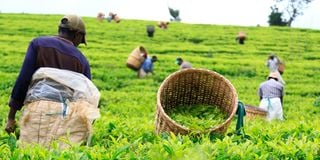Premium
Blow for James Finlay ex-staff seeking pay for workplace injuries

Workers pick tea leaves. Tea pickers seek Sh20bn from firm for work injuries.
Plans by Scottish health and law experts to inspect the activities of workers at James Finlay estates in Kericho County have hit a dead end after the Supreme Court blocked an intended site visit.
The five-judge bench led by Deputy Chief Justice Philomena Mwilu held that the intended visit to the tea estates had not been sanctioned by Kenyan authorities.
The team of experts wanted to inspect in depth four tea estates and factories owned by multinational tea producers as ordered by a Scottish court in November 2018.
The order, described in court as “locus inspection orders”, sprung from a case filed in 2018 by Kenyan tea pickers in Scotland seeking compensation for injuries sustained at the workplace.
But the Supreme Court on Friday upheld decisions issued by the Court of Appeal and the Employment Court previously, that the team of experts must seek assistance from Kenyan authorities and the courts, before touring the tea estates.
“It is our finding that the workers’ experts/examiners cannot enter the country to execute the locus inspection orders without authorization,” the court said, dealing a major blow to tea pickers who filed a lawsuit in Scotland seeking millions in compensation for injuries suffered at work.
The judges unanimously said that recognition and enforcement of foreign decisions/judgments is not automatic.
“To allow universal recognition and enforcement of foreign decisions would result in recognizing that foreign courts are superior to the national courts, thereby infringing on the sovereignty of a country,” said the Supreme Court.
The other judges on the bench were Mohammed Ibrahim, Smokin Wanjala, Njiki Ndung’u, and Isaac Lenaola.
The judges directed that Attorney General, Kenya Law Reform, and Parliament do commence an inquiry and develop the legislation on judicial assistance in obtaining evidence for civil proceedings in foreign courts and tribunals.
“We direct that this Judgment be placed before the Speakers of the National Assembly and the Senate, the Attorney-General, and the Kenya Law Reform Commission, attended with a signal of the utmost urgency, for any necessary amendments, formulation and enactment of statute law, to give effect to this judgment and develop the legislation on judicial assistance in obtaining evidence for civil proceedings in foreign courts and tribunals,” said the judges.
The court said that the “locus inspection orders” issued by the Court in Scotland do not meet the finality test and do not fall within the ambit of the Foreign Judgments (Reciprocal Enforcement) Act.
The judgment stemmed from a suit filed by a multinational tea producer in 2018 challenging enforcement of the orders issued by the foreign court.
The tea estates that were to be inspected included Tiluet– Chomogonday factory, Marinyn, Kaproret, and Kapsongoi Kitumbe factory all situated in Kericho County.
James Finlays contended that the enforcement will be in breach of the sovereignty of Kenya and abuse of protocol between the two sovereign states of the United Kingdom and Kenya.
The Employment and Labour Relations Court and the Court of Appeal ruled in favour of the tea company and blocked the intended inspection.
The decision was yesterday upheld by the Supreme Court after the judges dismissed an appeal filed by the former workers Elly Okongo Ingang’a, Lucas Onduso Omoke, Vitalis Otieno Muga, Rebecca Mongere Ochoi, and Joice Mongere Omwamba.
The seven former employees sued the company before a Scottish court, alleging poor working conditions among other violations such as suffering injuries/disabilities in the course of work at the tea plantations.
The Supreme Court held that the “locus inspections orders” issued by the All-Scotland Sheriff Personal Injury Court in November 2018 cannot be enforced in Kenya without assistance from Kenyan authorities and the courts.
“We have no difficulty finding that decisions by foreign courts and tribunals are not automatically recognized or enforceable in Kenya. They must be examined by the Courts in Kenya for them to gain recognition and to be enforced,” said the Supreme Court.
“Consequently, it is also our finding that Kenya as a sovereign state cannot automatically allow citizens, individuals or officers of a foreign state to carry out upon its own territory the decisions of a foreign court, without authorization from the Kenyan Government upon recognition of the decision of the foreign court or tribunal,” the court went on.
Such an action, the judges said, would violate the principle of sovereignty enshrined in Kenya’s Constitution.
“It is therefore our finding that the Appellants’ experts/examiners cannot enter the country to execute the locus inspection orders without authorization,” they said.
The workers filed seven suits at the All-Scotland Sheriff Personal Injury Court claiming to have suffered work-related injuries while at work in the James Finalys’ various tea estates and factories in Kericho.
They alleged a breach of duty to provide a safe working environment on account of negligence on the company’s part.
The Scottish court issued the “locus inspections orders” for a site visit of the tea estates and factories in Kericho for the purpose of observing the various activities such as tea pickers picking tea manually and with equipment.
The experts were also ordered to take measurements of the tea plants and areas where workers were required to work, including distance workers are required to walk to weigh tea.
In addition, photocopying and videoing work undertaken by the workers and considering Personal Protective Equipment (PPE) available to the workers, weighing the tea baskets when full of tea.
The experts were also to observe and take videos of picking, transporting, and weighing of the tea leaves, observing medical facilities available to the workers, and, weighing mechanical harvesting equipment for one, two, and three users.
The “locus inspection orders” are dated November 22, 2018, and amended on December 18, 2018.





